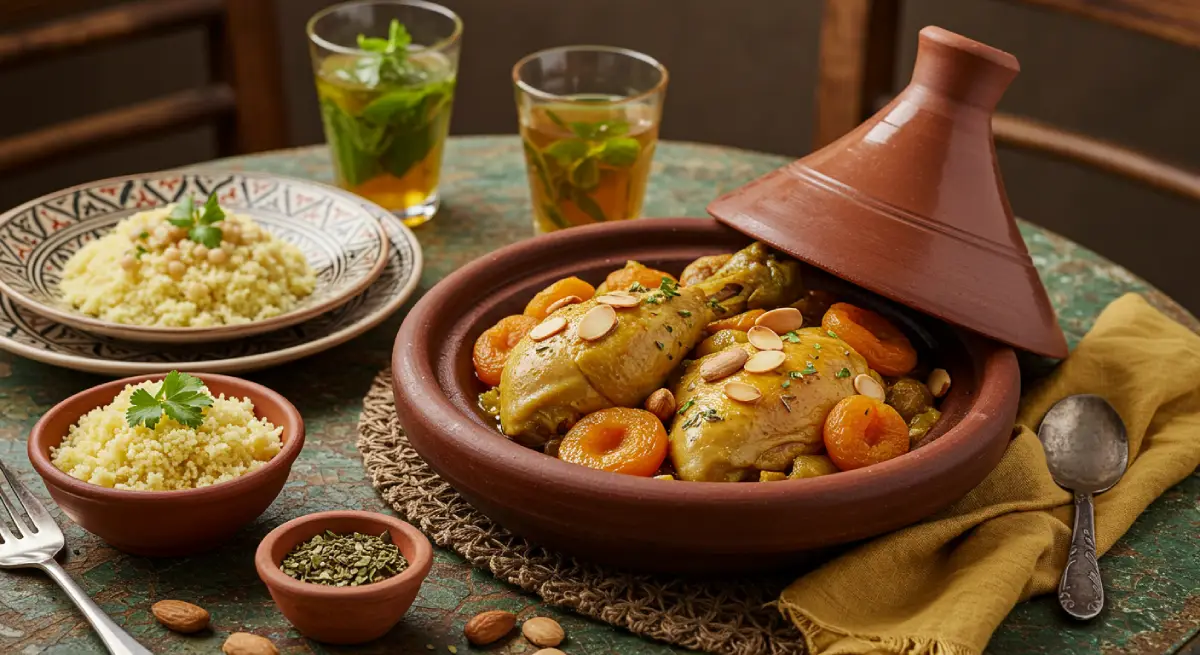
Table of Contents
The Day My Taxi Became a Time Machine to Tiflet
Wallah, some days… they stick to you. Like glue. Like that smell of old leather that follows me. After 20 years driving taxis in Rabat, I’ve changed cars maybe six times? Seven? But that smell… that smell stays. New taxi or old, it always comes back – leather, dust, and just a hint of mint from the sweets passengers leave behind. Even taxis have memories, you know?
Back then – when I was about 35, driving that white Nissan Evalia – that smell was already my companion. Like an old friend who never leaves your side… And that same day, in Tiflet, I discovered the flavors of my aunt’s famous tagine, the dish that would later inspire this blog. Today I call it my culinary journey, because every bite feels like a trip through time.
This day? Started normal. Keys. Engine. Aunt Khadija yelling from the backseat.
“Yallah, Khalid! Drive like you stole it!”
Four of my father’s sisters were in my white Nissan Evalia. Kaftans everywhere. Like a rainbow exploded in there.
Destination? Tiflet. For Fatiha’s engagement. My niece. Good kid. But the real ride? That tagine they made that night… sigh… still keeps me up sometimes.
Four Tantes, One White Nissan, and the Road to Tiflet
“Move your elbow, Jamila! You’re poking my eye!”
“Halima, stop eating dates! Save for tagine!”
“Khalid, turn up radio! I love this song!”
Chaos. Pure chaos. But good chaos. Like market day in the famous medina of Fez. I’m driving. Shifting gears. Laughing. Aunt Fatima’s pointing at mountains. That road to Tiflet wasn’t just family noise — it was also the road to my aunt’s tagine chicken, the recipe that later became our family’s Moroccan chicken tagine tradition.
“See Khalid? That’s where best almonds grow!”
Aunt Jamila’s fixing her hijab in the rearview mirror.
“Is my hair okay? Fatiha’s future mother-in-law is coming!”
The road changes. First the ocean smell. Then mountains. Big ones. Like giants sleeping. Tiflet comes. Red earth. Orange trees. Smells like… home.

→ Who’s this crazy taxi driver? Meet me here.
In Aunt Fatiha’s Kitchen: Where I Learned to Pound Almonds
8 AM. Tiflet. Aunt Fatiha’s house. Women everywhere. Running. Laughing. Pots banging. The bayt diaf was full already. Silver trays shining. Mint smelling fresh. That morning, before I even touched the mortar, I didn’t know I was about to take part in the secret that makes her tagine chicken unforgettable — the same flavors that define a true Moroccan chicken tagine.
Then Aunt Jamila grabs my arm.
“You. Mortar. Almonds. Now.”
Me? I drive a taxi. I don’t cook.
“Jamila, wallah, I don’t know—”
“Shut up. Pound. Like this.”
She shows me. Big stone bowl. Heavy. Almonds inside.Thud. Thud. Thud.
My arms burn. Sweat. My back hurts. But around me… magic. Aunt Fatima at the stove. Onions crying in the pan. Turning gold. Smells sweet. Aunt Khadija with saffron. Counting threads like gold coins.
“Careful! This costs more than your taxi!”
I keep pounding. Thud. Thud. Almonds breaking. Smelling nutty. A good smell. Like… like happiness in a bowl.
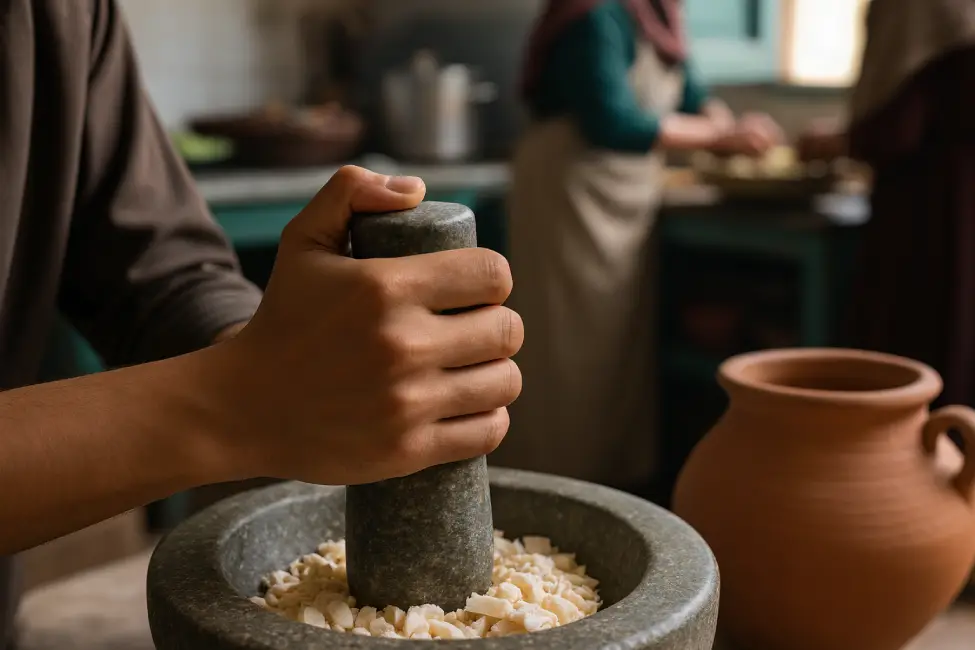
That First Bite: Why This Tagine Haunts Me Still
Sunset. Time to eat. Tables full. Couscous. Salads. Sweet things. But Aunt Jamila… she comes with a big tagine. Steaming. Like a small mountain. For me, that moment was more than dinner — it was the first bite of her famous tagine chicken. Soft chicken, sweet apricots, golden sauce, toasted almonds… it was everything a Moroccan chicken tagine should be, and it still haunts me today.
The lid opens. Whoosh. The smell hits me. Cinnamon. Onions. Something sweet. Apricots maybe? Chicken pieces. So soft. Falling apart. The sauce… thick. Golden. With the almonds I pounded. And sesame seeds on top. Like little stars.
I take a bite.… …Silence In my mouth? The chicken melts. Like butter. Apricots? Sweet but tangy. Almonds? Crunch. Like stepping on dry leaves. The sauce? Wallah… tastes like… like my mother’s cooking. Like childhood. Like Morocco in a spoon.
It was then I knew why my aunt’s tagine chicken would forever be remembered as a true Moroccan chicken tagine.
Uncle Ahmed pours tea. From a silver berrade. Glasses clinking. Aunt Jamila smiles.
“See Khalid? This is why we drive far roads. To carry tastes home.”
That night… I understood something. Cooking? It’s not recipes. It’s stories. It’s hands. It’s time. Today? I carry that story to you. In this tagine.
→ Want to learn more? Read about the history of the Moroccan tagine.
Why This Tagine Beats Every Online Recipe
I’ve eaten tagines in 50 cities. From Tangier’s port to Agadir’s beaches. From mountain villages to desert oases. After 20 years driving Morocco’s roads? My stomach knows things. But this tagine chicken — known in my family as a true Moroccan chicken tagine — is different. Special. Why? Three secrets my tantes gave me that no internet recipe has.
The Daghmira Secret: Onions That Weep Before They Sing
Aunt Jamila’s hands. Thick fingers. Gold bracelets. She’d stir the onions slow. So slow. She always said the secret of her tagine chicken — the kind of Moroccan chicken tagine people still talk about today — began with patience and onions that cry before they sing.
“Khalid,” she’d say, “onions must cry first. Then they sing.”
What’s a daghmira? It’s not just sauce. It’s the soul of my aunt’s tagine chicken, a golden onion jam that gives depth to every Moroccan chicken tagine. Cooked until it shines like a sunset over the Atlas Mountains — not brown, but gold. Then you add the ginger, saffron, cinnamon. Little by little. Like adding stories to a pot.
But the real magic? Those almonds I pounded? They are not just decoration. They go in the sauce, blended with apricots that have been soaked in rose water. That’s what makes this tagine chicken unforgettable — the sauce becomes thick, rich, and clings to every bite of the Moroccan chicken tagine like a baby to its mother.
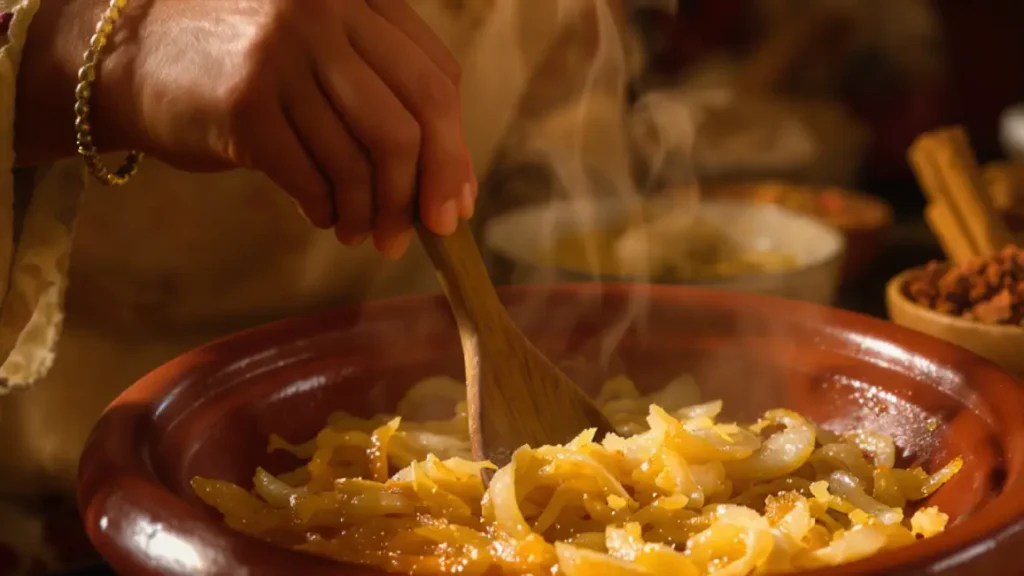
→ Master more sauce secrets in my tagine guide
Apricots, Almonds, Sesame: My Taxi Map of Morocco
Driving from Fez to Marrakech? You stop at roadside stands. Old men selling apricots.
“Taste, driver! Taste the sun!”
They’re sweet. But tart. Like life. That’s what they do in a tagine. They cut through the chicken’s richness and wake up your mouth.
Almonds? Wallah… I know almonds. From Taroudant’s trees. The best almonds. My tantes taught me: toast twice. First in a pan. Then in the oven. Until they smell like fresh bread. Until they crack when you bite. Like autumn leaves under taxi tires.
Sesame? That was my grandpa’s thing. The last sprinkle. Always. He’d say:
“Sesame is a blessing. Little seeds. Big magic.”
Now I do the same. Even in my kitchen in Rabat. Little seeds. Big memories.
→ Science says these spices heal more than just hunger
Clay Pot vs. Dutch Oven: A Driver’s Shortcuts
In Tiflet? Cooking is a team sport. Nine tagines on a charcoal fire. The clay lids like pointy hats. Steam goes up. Comes down like rain. Makes the chicken so tender… sidi… it falls apart if you breathe on it wrong.
But you? In your kitchen? No charcoal? No clay pot? No problem. This old driver has tricks:
- Trick 1: Burn the Chicken. Not brown. Burn. Blacken the edges. Like tires smoking on a mountain road. That’s where the flavor hides. In the burn.
- Trick 2: The Paper Hat. No clay lid? Use parchment paper. Place it between the pot and the lid. It traps the steam, just like a tagine’s cone. A cheap trick. It works.
- Trick 3: The Water Splash. Sounds crazy? When the apricots go in? Splash one spoon of cold water into the hot pan. It makes the sauce silky. Like a silk scarf from the souk.
“True story: Even now, at 60? I still burn the almonds sometimes. Aunt Jamila’s voice echoes in my head: ‘Khalid! You’d burn sunshine if we let you!’ But wallah… that tagine? Still tastes like Tiflet. Burnt almonds and all. Some things never change.”
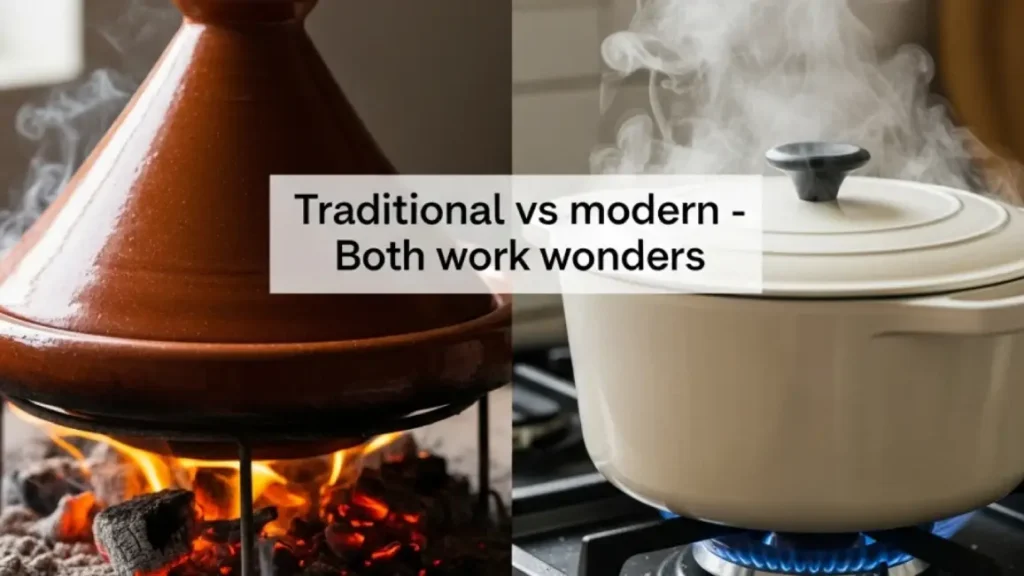
Why My Tantes’ Way is Different
Most online recipes take shortcuts. But Moroccan kitchens run on patience. Here’s the real difference:
| Their Recipe | My Tantes’ Way |
|---|---|
| Sauce = tomato + water | Sauce = onions + time + memory |
| Apricots = tossed in last minute | Apricots = soaked, blended, then folded into the dish |
| Almonds = boiled soft | Almonds = double-toasted until they crunch |
| Cook fast | Cook slow… like a desert sunset |
“The road may be long, but that’s how you reach the oasis.” – as my tante always said.
Cook Like My Tantes: Step-by-Step Guide
After 20 years driving Morocco’s roads? I know shortcuts. Real ones. Not just for traffic. For cooking too. This tagine? My tantes taught me with their hands, not paper. But since you’re not in Tiflet’s kitchen? I’ll show you the next best thing: a real Moroccan cook. Plus this old driver’s tricks.
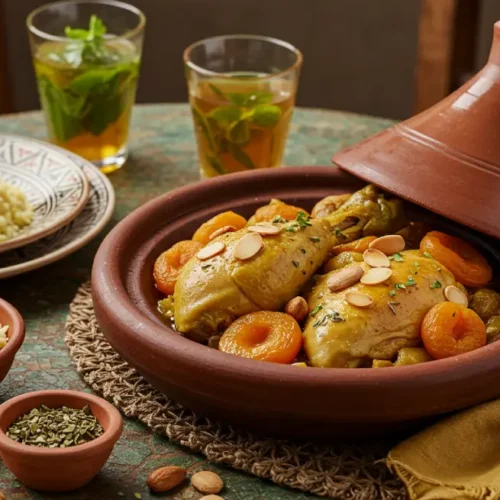
Tagine chicken with Apricots and Almonds | Authentic Moroccan Food.
Equipment
- 1 Tagine
Ingredients
- 4 chicken thighs (bone-in or boneless)
- 1 medium onion, finely chopped
- 3 garlic cloves, minced
- 1 cup dried apricots
- 2 tbsp almonds, toasted
- 2 tbsp olive oil
- 1 tsp ground cinnamon
- 1 tsp ground ginger
- 1/2 turmeric
- 1/4 paprika
- 1 cup chicken broth
- 1/2 cup water
- 2 tbsp honey
- Salt and pepper to taste
- 2 tbsp chopped fresh cilantro or parsley (for garnish)
Instructions
- Brown the Chicken: Heat olive oil in a tagine or large skillet over medium heat. Season the chicken thighs with salt and pepper, then sear them for 5-6 minutes per side until golden brown. Remove and set aside.
- Cook Aromatics: In the same pan, sauté the onions and garlic until softened, about 3-4 minutes.
- Add Spices: Stir in cinnamon, ginger, turmeric, and paprika. Cook for 1-2 minutes to release their aroma.
- Simmer the Chicken: Add chicken broth and water, then return the chicken to the pan. Cover and simmer on low heat for 30 minutes.
- Add Apricots and Honey: Stir in the dried apricots and honey. Simmer for another 15-20 minutes until the chicken is tender and the apricots are plump.
- Garnish with Almonds and Herbs: Sprinkle with toasted almonds and fresh cilantro or parsley before serving. Pair with couscous or rice for a complete meal.
Notes
- For extra softness, soak the dried apricots in warm water or orange juice before adding them to the tagine.
- Lightly toast the almonds in a dry pan before garnishing for a deeper flavour.
- Adjust the sweetness by adding more or less honey according to your taste.
My personal adds:
- 1 pinch orange blossom water → For that Tiflet taste
- 1 tsp sesame seeds → The final blessing
→ Need spice guidance? My blends guide has you covered
Ingredients + My Taxi Tips
Here’s what you’ll need:
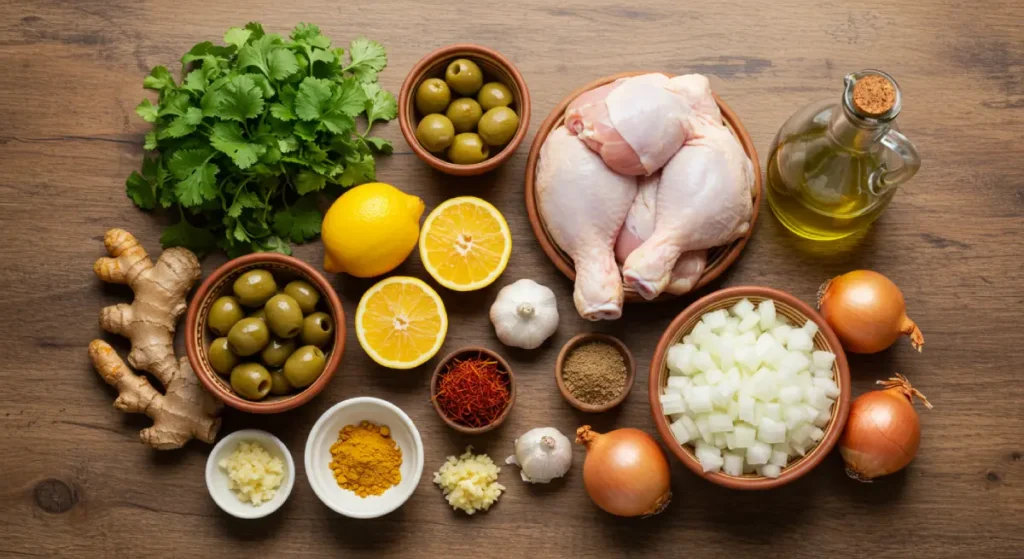

My Taxi Driver’s Hacks
These tricks? I learned them on 20 years of Moroccan roads. Not in cookbooks.
1. For perfect almonds:
“After toasting like in the video, toss them in a kitchen towel and rub hard. The skins fall right off! My tantes used to say: ‘Khalid, you can do anything… even undress almonds!’”
2. For silky sauce:
“Stir in 1 tbsp melted butter 5 minutes before serving. Gives it that glossy shine – like my taxi’s headlights on a dark road.”
3. No tagine? No problem:
“Use a Dutch oven with a ball of aluminum foil in the center. Creates a ‘chimney’ for steam, like the conical lid. Tested between Marrakech and Agadir – works!”
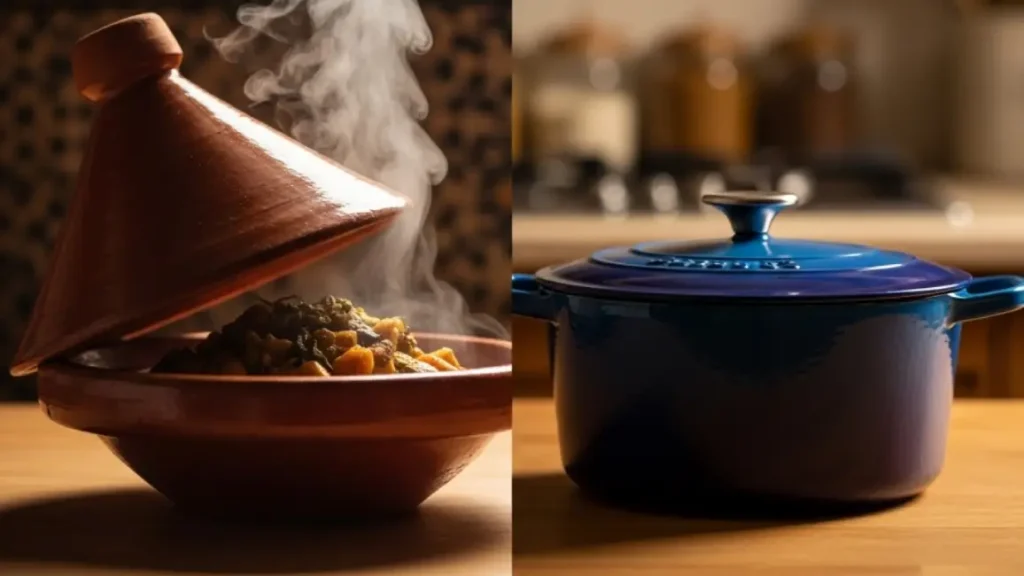
Serving Like My Tantes Did
H ere’s how to serve this treasure:
1. The sesame ritual:
“Sprinkle in a cross shape (baraka) saying ‘Bismillah.’ My grandpa always did this. Like blessing a car before a long journey.”
2. Essential sides:
“Khobz (bread) for dipping (like in the video at 7:20), shredded carrot salad, and of course… mint tea! At least three glasses. That’s the rule.”
3. The story to tell:
“When guests ask for the recipe? Tell them: ‘A retired taxi driver taught me this on the road to Tiflet…’”
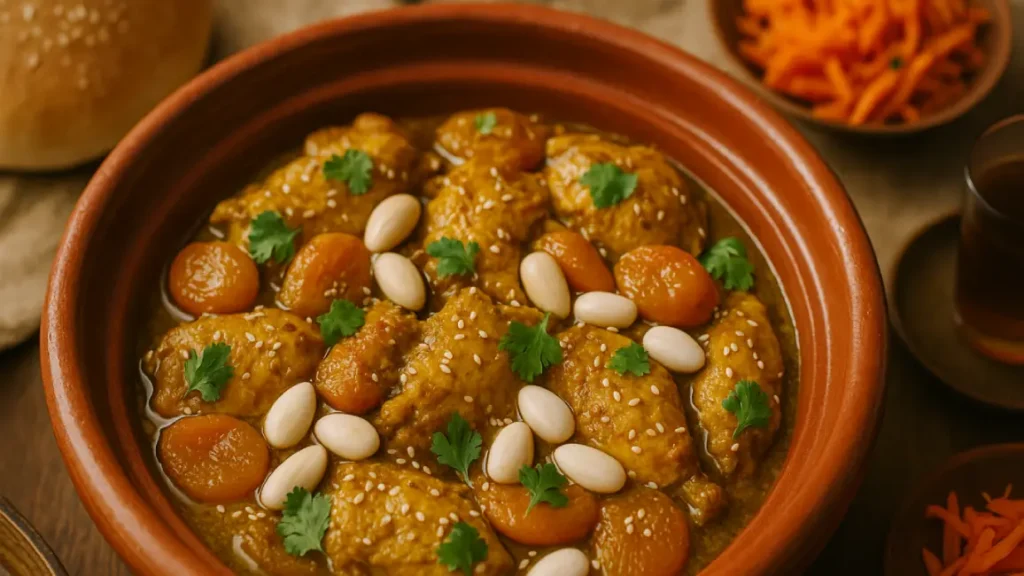
→ For the full feast experience, try these sides
More Moroccan Treasures to Explore
Driving from Casablanca to Ouarzazate? You don’t eat the same tagine twice. Morocco’s too big. Too many stories.
This recipe? My favorite. But sometimes? You need options. Like choosing routes – some coastal, some mountain roads.
Here are my other tagine adventures.
Try My Other Chicken Tagine Journeys
Different roads. Same soul. All tested in my taxi’s kitchen:
- Sweet & Smoky: Chicken Tagine with Prunes and Cinnamon
“Like driving through Atlas orchards at sunset. Prunes sweet. Cinnamon warm. Makes your house smell like Fez medina.” - Bright & Zesty: Flavorful Moroccan Chicken Tagine with Lemons and Olives
“For days you need sunshine in a pot. Preserved lemons? Tangy. Green olives? Briny. Like coastal breeze in Essaouira.” - Quick & Comforting: Easy Chicken and Gravy with Moroccan Flavors
“When you’re tired after long day. Like my taxi’s emergency sandwich – but fancier. Ready in 40 minutes.”
Vegetarian & Seafood Detours
Not all tagines have chicken. Morocco’s roads have many flavors:
- Mountain Comfort: Tagine Vegetable Recipe: Moroccan Comfort Delight
“What my tantes cook on meatless Fridays. Carrots sweet. Potatoes creamy. Like eating sunshine from Rif mountains.” - Coastal Catch: Fish Tagine with Artichokes and Peas
“Fresh from Agadir boats. Fish tender. Artichokes bright. Like tasting Atlantic waves.”
FAQ: Your Burning Questions Answered
After 20 years answering passengers’ questions? I’ve heard everything.
Here’s what you really need to know:
Can I Cook This Without a Tagine Pot?
Short answer: Yes.
Long answer:
“My taxi doesn’t have snow tires. But I drove in mountains anyway. Same here. No tagine? Use Dutch oven. My tricks:
- Brown chicken HARD – like tires smoking on mountain roads
- Parchment paper lid – makes steam like conical top
- Low heat – slower than Friday traffic in Casablanca
Result? Still tastes like Tiflet. I promise.”
What If I Can’t Find Dried Apricots?
Roadside alternatives:
“No apricots? No problem. Morocco’s full of backups:
- Prunes – sweeter, like driving through oasis
- Figs – softer, like desert sand
- Peaches (dried) – tangy, like coastal air
My favorite? Prunes. They soak up flavors like taxi seats absorb stories.”
How Do I Store Leftovers?
Chauffeur’s wisdom:
“Leftovers? Rare in my house. But happens:
- Fridge: 3 days max. Like milk – don’t risk it
- Freezer: 1 month. Wrap tight like luggage
- Reheat: SLOW. Gentle. Like warming cold hands
Pro tip: Add splash water when reheating. Brings sauce back to life.”
Is This Recipe Gluten-Free?
Straight answer:
“Wallah yes. No flour. No breadcrumbs. Just:
- Chicken
- Veggies
- Spices
- Nuts
Like my taxi – runs clean. BUT: Check spice blends. Some add wheat. I make my own. See how“
FAQ: Your Burning Questions Answered
After 20 years answering passengers’ questions? I’ve heard everything.
Here’s what you really need to know:
Can I Cook This Without a Tagine Pot?
Short answer: Yes.
Long answer:
“My taxi doesn’t have snow tires. But I drove in mountains anyway. Same here. No tagine? Use Dutch oven. My tricks:
- Brown chicken HARD – like tires smoking on mountain roads
- Parchment paper lid – makes steam like conical top
- Low heat – slower than Friday traffic in Casablanca
Result? Still tastes like Tiflet. I promise.”
What If I Can’t Find Dried Apricots?
Roadside alternatives:
“No apricots? No problem. Morocco’s full of backups:
- Prunes – sweeter, like driving through oasis
- Figs – softer, like desert sand
- Peaches (dried) – tangy, like coastal air
My favorite? Prunes. They soak up flavors like taxi seats absorb stories.”
How Do I Store Leftovers?
Chauffeur’s wisdom:
“Leftovers? Rare in my house. But happens:
- Fridge: 3 days max. Like milk – don’t risk it
- Freezer: 1 month. Wrap tight like luggage
- Reheat: SLOW. Gentle. Like warming cold hands
Pro tip: Add splash water when reheating. Brings sauce back to life.”
Is This Recipe Gluten-Free?
Straight answer:
“Wallah yes. No flour. No breadcrumbs. Just:
- Chicken
- Veggies
- Spices
- Nuts
Like my taxi – runs clean. BUT: Check spice blends. Some add wheat. I make my own. See how“
From Taxi Driver to Taste Keeper of Morocco
20 years. I’ve driven doctors to hospitals. Lovers to airports. Tourists to deserts.
But this? Sharing flavors? This is my best trip yet.
Every recipe on this blog is a passenger I picked up somewhere:
- Fisherman’s bastilla in Essaouira
- Shepherd’s couscous in Atlas Mountains
- This tagine in Tiflet
Now? I’m their chauffeur to your kitchen.
No meter running. Just stories. Just tastes.

“Want more passengers? Discover all my Moroccan journeys”
Nutrition Facts — Moroccan Tagine Chicken with Apricots and Almonds (Per Serving)
| Nutrient | Amount | % Daily Value (approx.) |
|---|---|---|
| Calories | 450 kcal | 22% |
| Protein | 28 g | 56% |
| Total Fat | 22 g | 34% |
| Saturated Fat | 4 g | 20% |
| Carbohydrates | 30 g | 10% |
| Dietary Fiber | 5 g | 20% |
| Sugars | 15 g | — |
| Cholesterol | 90 mg | 30% |
| Sodium | 450 mg | 19% |
| Potassium | 750 mg | 21% |
| Vitamin A | 35% | RDI |
| Vitamin C | 20% | RDI |
| Calcium | 10% | RDI |
| Iron | 25% | RDI |
Important Notes:
The values are indicative and may vary slightly depending on portion sizes and exact ingredients.
This table follows the common nutrition facts standards used in culinary blogs and e-commerce platforms.
📩 Stay Connected with Us!
📩 Join Our Moroccan Foodie Community
Get the best Moroccan tagine recipes and seasonal culinary tips straight to your inbox.
📌 Stay Connected & Join Me on Social Media!
Loved this chicken tagine recipe with apricots and almonds? 🥘✨
Don’t miss out on more authentic Moroccan recipes, step-by-step cooking tutorials, and kitchen tips. 📲
Follow me on social media and bring the flavors of Morocco straight into your home — one delicious recipe at a time!
Let’s create a community of food lovers passionate about Moroccan cuisine.
Share your creations with me by tagging them — I’d love to see your version of this traditional dish!
🏠 Discover More Moroccan Recipes!
🥘 Craving more delicious Moroccan dishes? Head over to our Home page for a collection of authentic recipes, cooking inspiration, and flavor-packed meals! Explore now!
💬 Share Your Thoughts!
Have you tried one of our Moroccan recipes? What’s your favorite dish, or do you have a secret ingredient that makes it even better? Leave a comment below! Your feedback helps us bring more delicious, authentic flavors to your table. Let’s chat about food!
